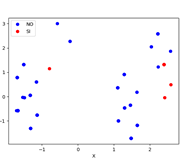Deep Learning for Forecast Scales to Prescribe Patients at Risk of Gastrointestinal Bleeding
Main Article Content
Keywords
Web design, Machine learning, training, decision trees, weka
Abstract
The evolution of medicine in current times has gone hand in hand with technology where more and more solutions are implemented; those supporting certain medical procedures to serve as base in the field of medical professionals. The process of analyzing data has become an essential resource in the practice of any profession; currently, in hospitals, more specifically in the university hospital La Samaritana. No tool allows the supporting of diagnosis to determine the supply or no, proton pump inhibitors, therefore we have developed an app using a machine learning model, based on decision trees through the weka application, which, after analyzing the data collected, allows the doctor to count with a tool to support this procedure. We hope that with this, doctors can perform an effective analysis before prescribing or not prescribing PPIs.
Downloads
References
[2] J. Johnstone, K. Nerenberg, and M. Loeb, “Meta-analysis: proton pump inhibitor use and the risk of community-acquired pneumonia,” Alimentary pharmacology & therapeutics, vol. 31, no. 11, pp. 1165–1177, 2010. https://doi.org/10.1111/j.1365-2036.2010.04284.x
[3] C.-S. Eom, C. Y. Jeon, J.-W. Lim, E.-G. Cho, S. M. Park, and K.-S. Lee, “Use of acid-suppressive drugs and risk of pneumonia: a systematic review and meta-analysis,” Cmaj, vol. 183, no. 3, pp. 310–319, 2011. https://doi.org/10.1503/cmaj.092129
[4] J. Leonard, J. K. Marshall, and P. Moayyedi, “Systematic review of the risk of enteric infection in patients taking acid suppression,” American Journal of Gastroenterology, vol. 102, no. 9, pp. 2047–2056, 2007. https://doi.org/10.1111/j.1572-0241.2007.01275.x
[5] U. Food, D. Administration et al., “Fda drug safety communication: Clostridium difficile–associated diarrhea can be associated with stomach acid drugs known as proton pump inhibitors (ppis),” Silver Spring, MD: US Food and Drug Administration, 2013.
[6] H. Wang, C. Ma, and L. Zhou, “A brief review of machine learning and its application,” in 2009 international conference on information engineering and computer science. IEEE, 2009, pp. 1–4. https://doi.org/10.1109/ICIECS.2009.5362936
[7] J. M. Moine, A. S. Haedo, and S. E. Gordillo, “Estudio comparativo de metodologías para minería de datos,” in XIII Workshop de Investigadores en Ciencias de la Computación, 2011. http://sedici.unlp.edu.ar/bitstream/handle/10915/20034/Documento_completo.pdf%3Fsequence%3D1
[8] J. A. Sidey-Gibbons and C. J. Sidey-Gibbons, “Machine learning in medicine: a practical introduction,” BMC medical research methodology, vol. 19, no. 1, pp. 1–18, 2019. https://doi.org/10.1186/s12874-019-0681-4
[9] M. Á. Vega, L. M. Q. Mora, M. V. C. Badilla et al., “Inteligencia artificial y aprendizaje automático en medicina,” Revista Medica Sinergia, vol. 5, no. 8, pp. e557–e557, 2020. https://doi.org/10.31434/rms.v5i8.557
[10] W. Hong, Z. Xiong, N. Zheng, and Y. Weng, “A medical-history-based potential disease prediction algorithm,” IEEE Access, vol. 7, pp. 131 094–131 101, 2019. https://doi.org/10.1109/ACCESS.2019.2940644
[11] M. Boehm, D. Burdick, A. Evfimievski, B. Reinwald, P. Sen, S. Tatikonda, and Y. Tian, “Compiling machine learning algorithms with systemml,” in Proceedings of the 4th annual Symposium on Cloud Computing, 2013, pp. 1–1. https://doi.org/10.1145/2523616.2525965
[12] M. M. Kaklamanis and M. E. Filippakis, “A comparative survey of machine learning classification algorithms for breast cancer detection,” in Proceedings of the 23rd Pan-Hellenic Conference on Informatics, 2019, pp. 97–103. https://doi.org/10.1145/3368640.3368642
[13] A. N. Reiz, M. A. de la Hoz, and M. S. García, “Big data analysis y machine learning en medicina intensiva,” Medicina Intensiva, vol. 43, no. 7, pp. 416–426, 2019. https://doi.org/10.1016/j.medin.2018.10.007
[14] S. Chadha, “Clinical oracle: Machine learning in medicine,” Berkeley Scientific Journal, vol. 23, no. 2, 2019. https://doi.org/10.5070/ BS3232045344


